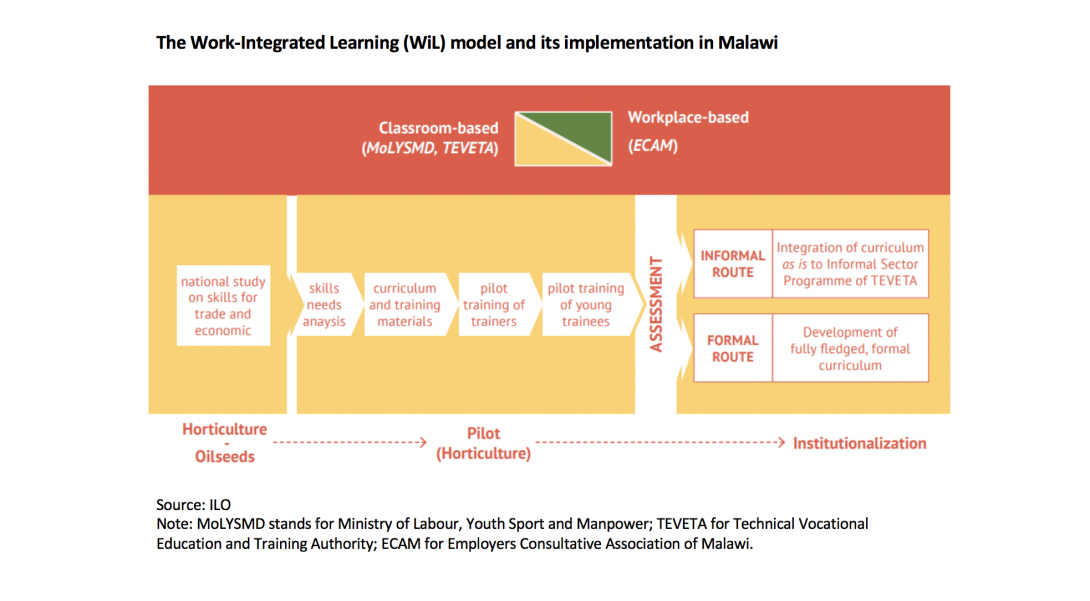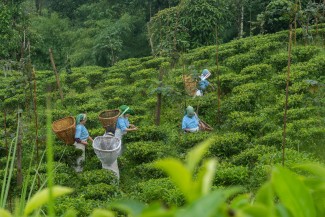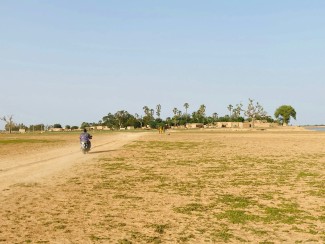|
|
|
Unemployment, underemployment and employment in economically marginal work are a major challenge for development in Malawi, as in many least developed countries. The most recent Labour Force Survey shows that 21.7 percent of the nation’s youth aged 15-24 are neither in employment, education or training, and approximately 27 percent of those with a job are underemployed. Women are especially disadvantaged due to lower earnings than men and with two-thirds among those of working age in vulnerable employment.
The International Labour Organization’s (ILO) Skills for Trade and Economic Diversification (STED) programme supports national partners to develop the current and future skills needed in tradable sectors for higher exports, import competition and greater diversification. The objective is to leverage skills to create opportunities for productive and decent employment – in line with Sustainable Development Goal targets 4.3, 8.5 and 8.6 – that will particularly benefit youth. Prospects for women are a cross-cutting issue factored into sector selection and support.
Here we look at skills development strategies implemented in the agricultural sector in Malawi, and consider some of the lessons that can be drawn for aid for trade initiatives more broadly.
Agricultural export potential in Malawi
Malawi is a landlocked least developed country that has seen moderate growth in recent years and whose national poverty rate remains above 50 percent. The economy is highly dependent on agriculture, which accounts for 64.1 percent of overall employment and 58.4 percent of youth employment, with a high share of women. The sector is dominated by smallholders, productivity is low and – with the exception of growers of major commodities such as tobacco and tea – predominantly services local markets. Around 13 percent of the working age population, mostly without secondary education, work in subsistence agriculture.
The Government of Malawi is committed to strengthening the employable skills of the country’s labour force. The latest National Export Strategy (2013-2018) identifies skills development as a fundamental requirement for business to realise the country’s growth and export potential. Harnessing this potential to become a regional exporter in agriculture is seen as an avenue for increasing employment and boosting economic growth.
In 2015, responding to the request by the Government of Malawi to support the achievement of Malawi’s National Export Strategy, the ILO, in collaboration with national partners, started implementation of the STED approach in oilseeds and horticulture. A STED analysis of Malawi’s horticulture sector showed that it is largely underdeveloped, with almost all firms serving the domestic market. Productivity is low, product quality is poor and weak supply chain logistics prevent smallholder farmers from accessing more lucrative markets through retail, processing and exports.
The study further indicated that the majority of firms believe that there is export demand for Malawian horticulture products. However, skills are a key limiting factor affecting the sector’s capacity to achieve its export ambitions, and even to supply domestic customers in retail and hospitality that require reliable deliveries of high quality vegetables. In response, a number of interventions were implemented targeting young women and men as part of a sectoral skills strategy.
Upgrading young people’s skills
One such intervention is a pilot project for youth in the horticulture sector called Work-Integrated Learning (WiL) that was developed and implemented in 2016 in partnership with the Malawi government and an employer association.
WiL is a value chain-based skills upgrading course intended to produce graduates with hands-on skills that meet industry needs. It is founded on the premise that training that takes place partially within the workplace will produce learning outcomes more closely aligned with labour market competency requirements.
The Work-Integrated Learning (WiL) model and its implementation in Malawi

The initial iteration of WiL was taken forward via two channels. First, through integration into an existing official informal sector programme. Second, through the establishment of formal national curricula in horticultural production delivered through the government Department of Technical and Vocational Training (TVET) system.
This result is significant because Malawi did not previously have a nationally owned certification system for education in horticulture. It has allowed the curriculum to be rolled out through the formal TVET system, which did not previously focus on skills in agriculture. The WiL initiative has improved the employability of the young beneficiaries and moved them into productive work.
Empowering women farmers
As part of STED implementation, another intervention under the SKILL-UP Malawi Project was designed as an integrated programme to strengthen knowledge and skills among women farmers, with initial implementation in a village called Bvumbwe Chinkwende with a history in horticulture production.
Women farmers – who play an important role in the horticulture sector in Malawi – were trained and linked to a local anchor, Roseberry Farms, to help manage their markets and retail distribution. The programme, implemented in collaboration with the Bvumbwe Agricultural Research Station, has provided skills development in areas such as agronomy, pest and disease control, and business, in both open field and greenhouse farming. This has resulted in quality and quantity improvements in production, and the anchor farmer linkage has helped secure a stable market with improved profit margins. Importantly, the programme includes training on gender equality targeted at village leaders and spouses.
To ensure the sustainability of the programme, additional partnerships with local agricultural research institutions are being developed in order to extend the approach into other regions of Malawi.
Impacts
Taken together, these two interventions have strengthened the domestic value chain for high quality vegetables, allowing supermarkets and hotels to source a much larger share of their requirements locally. This has provided opportunities for farmers and for employment along the value chain, greatly improving the lives of many of the participants.
The interventions are being mainstreamed into the work of the education and training system and of the agricultural research infrastructure, for scale-up and sustainability. The initiatives have connected Malawian producers to regional retail value chains that may provide opportunities to export horticultural products in the future.
A key lesson learned from the Malawi experience is that the effective implementation of export-led development policies can benefit from supportive sectoral skills strategies, and from coherence between policies on trade and skills. Collaboration is needed between government ministries responsible for trade and for skills development, as well as the line ministries that oversee each productive sector. The active involvement of the industry is also needed, ideally through enterprises and employer and worker representatives.
Potential synergies with aid for trade could be further explored as STED provides a mechanism to identify and respond to the skills shortfalls that constrain a least developed country’s effective participation in international trade.
------------
* Cornelius Gregg is Senior Technical Specialist, Skills and Employability, ILO; Bolormaa Tumurchudur Klok is Technical Specialist, ILO; and Milagros Lazo Castro is Technical Officer, ILO. The authors would like to thank their colleagues from the ILO SKILL-UP project for their contribution to this article, Patrick Makondesa (ILO Malawi), Gift Mabvumbe (ILO Malawi), Sergio Iriarte Quezada (ILO headquarters) and Adame Traore (ILO headquarters).
--------
This policy series has been funded by the Australian Government through the Department of Foreign Affairs and Trade. The views expressed in this publication are the author’s alone and are not necessarily the views of the Australian Government.
If you would like to reuse any material published here, please let us know by sending an email to EIF Communications: eifcommunications@wto.org.



